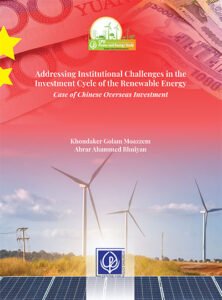 Bangladesh requires large-scale foreign investment to transition towards a renewable energy-based system and achieve its national renewable energy targets. Despite an open investment policy, the country has not realised the expected growth in foreign investment due to legal, institutional, and operational challenges. Over the years, the country has focused more on investment promotion rather than investment facilitation. This study examines the investment facilitation environment in Bangladesh’s renewable energy sector, focusing on the business establishment and project implementation stages of renewable energy businesses, with particular attention to the Chinese investors. Using a multi-aspect framework based on the UNCTAD Action Menu for Investment Facilitation, the study assessed regulatory transparency, predictability, electronic governance, inter-agency coordination, application procedures, responsible business conduct, and anti-corruption mechanisms. Based on questionnaires, interviews with experts, investors, company officials (local and foreign), government representatives, and desk research, the findings reveal that although Bangladesh has taken steps like establishing an open tender system, investment facilitation remains uneven and inefficient. Regulatory transparency is moderate but fragmented; electronic governance is poor to nascent; focal point and review mechanisms are weak; the application process is opaque and inconsistent; inter-agency cooperation is limited and whilst the framework for responsible business conduct and anti-corruption is legally aligned, enforcement is weak, and investor confidence remains low. Sudden policy changes, such as the cancellation of Letters of Intent (LoI), have further undermined investor confidence, creating far-reaching implications for renewable energy investment. The study shows that targeted reforms, such as complete digitalisation of business establishment and tender processes, ensuring transparency through consistent notifications to investors during evaluations, streamlining procedures via a single platform to avoid repeated document submissions, strengthening inter-agency coordination among government bodies like BIDA, BPDB, SREDA, and the Ministry of Land, and maintaining policy consistency across regimes to reduce uncertainty, are essential to make the investment process more efficient, predictable, and attractive for both local and foreign investors. Rather than attempting a complete overhaul, the study suggests following a retrofitting approach: prioritising key actions that will have the greatest impact in strengthening the investment facilitation ecosystem in the renewable energy sector.
Bangladesh requires large-scale foreign investment to transition towards a renewable energy-based system and achieve its national renewable energy targets. Despite an open investment policy, the country has not realised the expected growth in foreign investment due to legal, institutional, and operational challenges. Over the years, the country has focused more on investment promotion rather than investment facilitation. This study examines the investment facilitation environment in Bangladesh’s renewable energy sector, focusing on the business establishment and project implementation stages of renewable energy businesses, with particular attention to the Chinese investors. Using a multi-aspect framework based on the UNCTAD Action Menu for Investment Facilitation, the study assessed regulatory transparency, predictability, electronic governance, inter-agency coordination, application procedures, responsible business conduct, and anti-corruption mechanisms. Based on questionnaires, interviews with experts, investors, company officials (local and foreign), government representatives, and desk research, the findings reveal that although Bangladesh has taken steps like establishing an open tender system, investment facilitation remains uneven and inefficient. Regulatory transparency is moderate but fragmented; electronic governance is poor to nascent; focal point and review mechanisms are weak; the application process is opaque and inconsistent; inter-agency cooperation is limited and whilst the framework for responsible business conduct and anti-corruption is legally aligned, enforcement is weak, and investor confidence remains low. Sudden policy changes, such as the cancellation of Letters of Intent (LoI), have further undermined investor confidence, creating far-reaching implications for renewable energy investment. The study shows that targeted reforms, such as complete digitalisation of business establishment and tender processes, ensuring transparency through consistent notifications to investors during evaluations, streamlining procedures via a single platform to avoid repeated document submissions, strengthening inter-agency coordination among government bodies like BIDA, BPDB, SREDA, and the Ministry of Land, and maintaining policy consistency across regimes to reduce uncertainty, are essential to make the investment process more efficient, predictable, and attractive for both local and foreign investors. Rather than attempting a complete overhaul, the study suggests following a retrofitting approach: prioritising key actions that will have the greatest impact in strengthening the investment facilitation ecosystem in the renewable energy sector.
Authors: Khondaker Golam Moazzem, Abrar Ahammed Bhuiyan
Publication Period: October 2025


